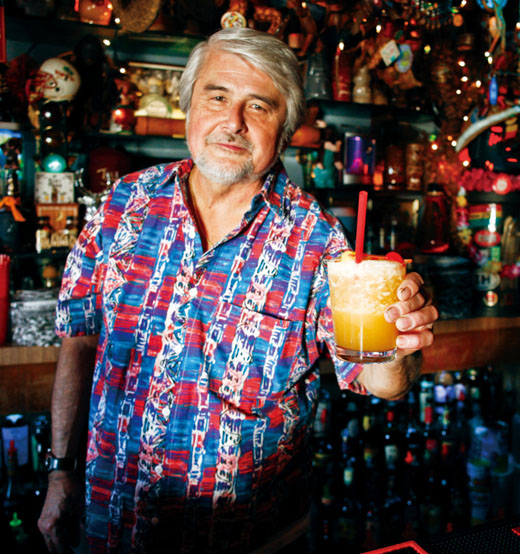Puka Punch
This sophisticated rum cocktail with its dark, spicy depths comes from the Tiki-Ti, a Los Angeles institution and a shrine to well-made tropical drinks. Puka Punch is a relic of the golden age of tiki cocktails, roughly from the 1930s to the 1950s, when some of the most talented mixologists were focusing on exotic drinks. This recipe calls for three different rums, but you can substitute either dark or white rum for any of them.
2 oz. white rum
1 oz. fresh lime juice
¾ oz. dark Jamaican rum
¾ oz. fresh orange juice
¾ oz. pineapple juice
¾ oz. passion fruit syrup
2 tsp. honey mixed with
2 tsp. hot water and chilled
¼ oz. falernum (optional)
1 dash Angostura bitters
¾ oz. 151-proof rum (optional) Pineapple slice, orange wedge, and maraschino cherry, for garnish
Makes 1 cocktail
1. Put 1½ cups ice cubes into a blender and crush. Add first 9 ingredients and blend on high speed. Pour into a tall glass.
2. Slowly pour 151-proof rum over back of a spoon into cocktail. Garnish with pineapple, orange, and cherry.
Polynesian Spirits
They don’t serve beer. They don’t serve wine. For weeks at a time, they don’t serve anything at all—whenever they feel like getting sand between their toes, they close up shop. The owners of the Tiki-Ti in the L.A. neighborhood of Los Feliz are textbook examples of how not to succeed in the bar business; nevertheless, for over 49 years the Buhen family has been slinging Singapore Slings and Missionary’s Downfalls for a fanatical following. My first visit was in 1979. I’d previously dismissed tropical cocktails as slushy umbrella drinks, but the Tiki-Ti’s came with an impressive pedigree: many of them were invented at the country’s first tiki bar, Don the Beachcomber (opened in the mid-1930s), where Ray Buhen, a native of the Philippines, was one of the original bartenders. The Beachcomber attracted a Hollywood crowd and kick-started the midcentury Polynesian craze. Ray Buhen spent the golden age of tiki honing his craft behind some 60 different bars. In 1961, Ray; his wife, Geraldine; and son Michael (pictured) opened a place of their own. Ray died in 1999, but his spirit lives on at the Tiki-Ti.
—Jeff Berry
